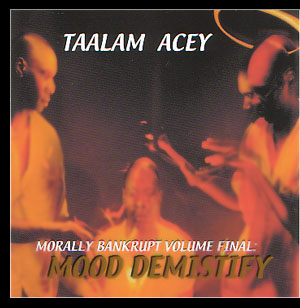| in Plain Text |
| Current features |
| Past articles |
| main features |
| spoken word: Book of Voices |
| poetry video: Videotheque |
| background: about e-poets |
| other features |
| network neighborhood |
| e-poets network partners |
| artist Heather Haley Vancouver, BC, Canada |
| Cinasphere Vallejo, California, USA |
| Poet in Residence Queensland, Australia |
| Farrago Poetry London, England |
|
artist Patrick Sanchez poet-at-large |
| e-poets network Chicago, Illinois, USA |
follow us  on Facebook on Facebook |
Brilliantly immoral
A review of Taalam Acey's Morally Bankrupt Volume Final: Mood Demistify
filed 27 February 2001 | Chicago by Nikki Patin
Morally Bankrupt Volume Final: Mood Demistify is Taalam Acey's best work to date. It is dark, moody, and fiery, much like the CD cover. Once again, Acey blends his trademark voice with an exacting brilliance that is both breathtaking and disturbing. I've never heard anyone else do spoken word like Taalam does it, and I doubt I ever will.
It's easy to see why he has become so popular in the last year. Most poets who tour or make CDs or perform regularly are decent writers and performers. They can captivate an audience, as well as shed light on some topics. However, Taalam is beyond that. What he brings to spoken word is a sense of urgency and painful facts. Taalam's sense of urgency is bred from his ability to make the socio-political less impersonal by making the socio-political personal. This section from the track, "Come Back Forward," illustrates that ability:
"And look at him sitting there
Still thinking this is a white man's world
When his cellmate is white
And his cellmate is thinking if we could just
Get rid of these niggas
I could economically improve my trailer-park life
Become a father to my children
And a husband to my wife
He has yet to figure
That he's just a flesh-colored nigga
Who can't even afford the luxury of being white
Both of them blaming each other
Live in the same cell
Living the same life"
By transferring commonly-held racial perspectives into the mindsets of prison inmates, Taalam has effectively given his audience insight into that life, as well as illuminate how one-sided those attitudes are. The urgency of his poetry comes from the insight and the illumination that strives to
The choice trackMy favorite piece on this album, "I Could Be Killed for What I'm Thinking," is ingenius. I won't give anything away about it, especially not the metaphor, but I must acknowledge it. This poem is very dark and deals with a subject matter that is prevalent in poetry. The way it is presented exhibits the brilliance of the work. It is a new spin on a very old subject and avoids being trite or predictable. It is, without a doubt, the best piece I've ever heard, rivaled only by Lucy Anderton's "The Virgin Mary." Lucy's poem falls into the genre of "persona poetry," which is a poem that speaks from a point-of-view not belonging to the writer. For instance, writing a poem from the perspective of a Vietnam Veteran without ever having fought in Vietnam. Lucy's poem is written from the perspective of the Virgin Mary and explores what she might have felt about the events surrounding the birth of Christ. What makes Lucy's poem stand out is the innovative approach she takes to a story that is, arguably, one of the best-known stories in history. It takes a lot of courage to re-tell an ancient story from a different perspective, as well as explode all known assumptions in the process. Two qualities link Taalam's poem and Lucy's poem---courage and innovation. - NAP | |
For more info...Additional info about Taalam Acey and this CD is available online. | |
His work is particularly hard for African-Americans to hear.
African-Americans have been marginalized into victim roles as a way to diffuse their collective power. Most African-Americans are fine with this, as the good economy has smoothed the way for apathy. Taalam, however, forces everyone to look into the past and note that no one is innocent when it comes to history.
For a people who were displaced into a country where history is warped by politics and who know hardly anything about their own history beyond their place in America, Taalam's statements that expose human behavior beyond color is a little hard to take. There is no way of getting around honesty, or, at the very least, theories that have been based on something more concrete than personal opinion. Poetry is subjective, but it's refreshing to hear work that is responsible and educational, rather than self-serving. Taalam has worked hard to attain the knowledge he possesses, which allows him to impart this knowledge with pride, rather than humility. According to an interview with Michael Meyer of NYU, Taalam states that he writes "to rationalize issues or feelings, and to summarize my understanding of historical facts and/or social realities."
The visions that come alive through his words give us a perspective that most folks don't even know exists. For example, on the track, "Live from the VD Clinic," Taalam breaks down some of the fallacies that permeate our current perceptions of slavery and how simple it is to forget what came before us in the light of present circumstances. These lines from "Live from the VD Clinic," represent how Taalam underscores how history has inevitably affected his own:
"Isn't it tragic
that the very same maritime skills that the
Africans and Arabs
helped the Spanish and Portugese to master
would be the same skills that they would use for our
eventual capture our eventual massacre
and isn't it tragic
that they waited till the reign of Sunni Ber Ali fail
and doesn't it seem like since the death of
that black man
this world, at least for African men, has
been a living hell"
Slavery is only discussed in one way in America -- how wrong it was. No one ever really talks about slavery before its incarnation in America or how slaves were utilized in other cultures. No one ever talks about the civilizations that thrived in Africa and how many technological advances and societal traditions were born from those civilizations. The extent of what remains in the shadows of American history is unknown to the majority of the American public. African-Americans are no exception. When the history is presented, many of us act uninterested.
"and she looked at me like
'who gives a fuck...don't drink any milk
until you finish all these pills.'"
"Live from the VD Clinic" is a humorous context through which a serious point is illustrated:
"But what gets me to this day
Is that people would rather hear
About a 15-year old with VD
Than their own ancestors' history of slavery."
Unlike many minority spoken word artists, Taalam discusses race contextually, always from an unforgivingly objective point of view. But I've never once heard anything written by him that casts him in the role of a victim. To illustrate this point, here are a few lines from "I Could Be Killed For What I'm Thinking."
"I hear a million ancestors yell that I have no right
To have no life
They tell me that I am exactly what comes after
The ones that survived the Middle Passage
They tell me that I am directly descendant from the ones
Who thought it was punk shit to jump ship."
 From an artistic view, Taalam has pushed some boundaries with this
release. He's incorporated more music, metaphors, and some sound effects and
has balanced live performances with produced tracks. The live tracks are
great on this album because they allow you to hear the words garner audience
reaction, whether good or bad. It's an example of how well Taalam interacts
with his audience and how much he is willing to let the work stand on its
own merits.
From an artistic view, Taalam has pushed some boundaries with this
release. He's incorporated more music, metaphors, and some sound effects and
has balanced live performances with produced tracks. The live tracks are
great on this album because they allow you to hear the words garner audience
reaction, whether good or bad. It's an example of how well Taalam interacts
with his audience and how much he is willing to let the work stand on its
own merits.
The live tracks that get stronger reactions, such as "She Conjurez," affect the listener on a deeper level because you can hear the energy of the crowd behind it. The work becomes a living, breathing thing when riding on the energy of people experiencing it. "She Conjurez" is an example of a few pieces on the album that have been put on the album twice---one recorded live and the other in the studio. A great idea that wasn't over-utilized!
The difference between studio recording and live recording is simply this: studio tracks can be bone-dry, with just the artist's voice or can include sound effects or music to provide a sonic foundation for the words, whereas live tracks are more spontaneous, utilizing the audience's reaction as part of the soundscape. The way Taalam uses both is innovative, because he gives the listener the chance to hear his more fleshed-out artistic vision on the studio tracks, then he reintroduces the same pieces towards the end of the cd, but performed live this time. It bridges the gap between the album and concert that most listeners struggle to close on their own. As stated before, the inclusion of both removes any doubt that the listener might have that this work will not hold up in front of an audience, as well as allows Taalam to stretch out artistically. A great example of how studio production works wonderfully juxtaposed to live recording is, as mentioned earlier, "She Conjurez." The studio version includes music and is slower, while the live version is a bit faster and leads into "Moan," which is sort of a companion piece.
Finally, having seen Taalam perform live several times, I must say that he is the standard for modern spoken word. He is polished, fully memorized, gracious, humble, and incredibly learned. Watching Taalam on stage is not simply taking in, but it is an exchange, a dance between him and the audience. He is aware and in the moment at the same time, daring you to look away, get bored, or not listen. To paraphrase another of Taalam's pieces, seeing him perform is like having sex. A lot of other poets get onstage to masturbate. But Taalam demands that we come...back for more? Absolutely, yes!
- Nicole A. Patin
| Nikki Patin is a writer, vocalist, and performance poet from Chicago. Her performing career has led her to numerous venues in the city including Mental Graffiti, where she is a top-ranked slam poet, and to Cabaret Metro. |  |
| e-poets.net copyright © 1999-2016 e-poets network all rights reserved get in touch with us | tech info | legal | founder |


